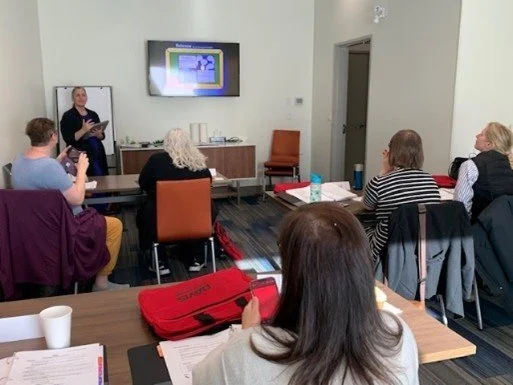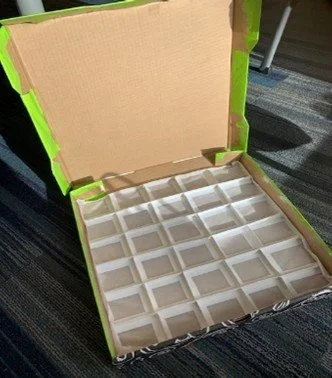
NeuroInclusivity for Early Years
We are delighted with the results of our Professional Development pilot for Early Childhood Educators!
NeuroInclusivity for Early Years
a unique opportunity to share simple self-management tools with 3-5 year olds…preparing them for school.
This professional development pilot was funded via BC Campus and provided ECEs with unique, simple skills to share with their children. The skills enable the children to focus, relax and manage their energy levels ready for learning.
Following interviews, the course involved two information sessions, a two day workshop and monthly assignments, plus an optional parent information module .
By incorporating these strategies into preschools, we now know this is the first step to achieving NeuroInclusivity for all students, no matter their learning styles, and the demise of so-called learning disabilities.
We thank the Ministry of Education & Child Care, who funded the pilot and allowing us, The Whole Dyslexic Society, the opportunity of sharing this innovative, inspiring, enlightening and essential information for FREE! Our current goal is to ensure that this opportunity is widely available to all ECEs.
If you represent a school, early childhood education center, or government agency and are interested in exploring how this project could support your community, we’d be happy to share our findings and discuss next steps.
Davis Learning Strategies for Early Childhood Educators Pilot Report
Sue Blyth Hall, January 5, 2024
In 2023, the Ministry of Education and Child Care in British Columbia, asked BC Campus to invite new opportunities for the professional development of Early Childhood Educators.
Davis Dyslexia Association International in San Francisco created the Davis Learning Strategies for K-3 teachers Workshop many years ago, and The Whole Dyslexic Society has hosted several in BC.
One of our Board, Julie Brewer, who is a Montessori Pre-School teacher took one of those Workshops. She adapted the tools and strategies to use with her pre-school 3-5 yr olds with incredible and unexpected success. They learned to relax, to control their energy levels, focus, and master their alphabet letters individually.
This gave us the courage to apply and to our shock and delight, we were awarded the grant! It was a RUSH ! We were accepted in August 2023, didn’t get through the paperwork till October and the whole pilot had to be completed by the end of January 2024. No pressure!
Our advertisement for Davis Learning Strategies for Early Years, attracted an amazing response response from Early Childhood Educators. We received 60 enquiries within one week! They were attracted by the idea of their children learning how to self-manage and who wouldn’t be? After the interviews, our Administrator, Laura O’Neill got everyone familiar with the Thinkific e-learning platform, and it was all systems go!
We had to be as accessible as possible and ECEs have very little spare time, so we decided on live webinars that would be recorded and placed on their Thinkific accounts. We created a Theory Module and a History Module to give them as much background information on learning challenges and Davis Learning Strategies as possible. They had to complete a simple assignment to go from one Module to the next… no skipping our classes 😊.
Julie and I modified the Davis Learning Strategies for K- 3 Classroom teachers Manual for the Early Years. We had to offer the DLS for Early Years 2 Day Workshop both Online and In-Person and were thrilled that Stacey Smith was our very enthusiastic Presenter for both.
Julie found a venue and we were excited to have Stacey and Larry come to Vancouver Island, and although the Online Workshop was perfect… the In-Person one had the extra fun element as attendees were able to share experiences, tips and creations.
Following the Workshop we created Assignments, one week for Release, the next week Dial and the third week Focus and the last week, Koosh ball toss. Some ECEs managed to start individual Letter Mastery in the fourth week. We collected all the Assignments and Julie’s Google Evaluation form produced colourful pie charts and comments that confirmed it was a huge success.
Some of the ECEs decided to continue to the end of June and some are even planning their next academic year. These are the comments that warm our hearts and stoke the fire to keep this course going… plus one little boy learned to ride his bike thanks to his 3 tools!
I have attended a great deal of professional development and this was by far, the most inspiring, engaging and applicable by a long shot. Please keep me informed of other workshop opportunities, and any developments from the pilot. It was a great experience and I am committed to creating NeuroInclusive classrooms where all children can thrive. I believe this program has better prepared me to be able to do that.
The main reason that I love the DLS tools is that they are collaborative/used collectively as a group in the classroom (including teachers) instead of pointing particular children out. The children have ownership in the atmosphere of their classroom and can help themselves, friends, and teachers to kindly check on each other. The language is wonderful- “check your dial”, “hmm, let’s see if a release can help us feel better” , “it looks like “Bobby’s” dial is at a 5, where is your dial at? Maybe see if you can try matching Bobby’s dial and then give another try at sharing and playing together”
They are so helpful for children to start being able to self-regulate and be more aware of how they feel and how others are feeling around them. It makes a huge difference in their ability to have calm bodies, keep their hands to themselves, and be able to fully participate and engage in learning activities.
The release technique in particular has been a game-changer for our group of 20 kids. We have attempted various relaxation/focus strategies in the past without long term success. The difference in attention for our circle times since using release has been absolutely incredible!
I plan to continue working on this. i have seen the value in it for the children and the class as a whole. it has reduced problem behaviors, and staff stress levels. I have been telling everyone about it! thank you for letting me be a part of this pilot project. I can’t think of anything to improve on in this workshop.
So what happened next? Well, our final report went to the Ministry of Education and Child Care… as will Sue… because we very much hope we can continue the success. We have plenty of constructive comments and first-hand experience to result in one more fabulous Davis offering. Whatever children learn from 0-5 stays with them… so our hope is that those who might have been seen to learning differently, never find a learning disability label is attached to them.
We are so grateful to all those who took part in a very exciting, profoundly beneficial professional development pilot. Hugs all round 😊thank you.








